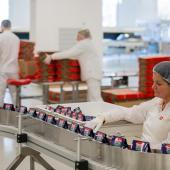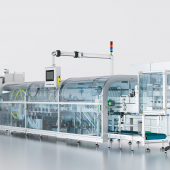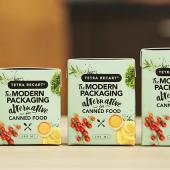A ognuno il suo (mestiere)
Editorial by Stefano Lavorini. What on earth makes me do it? This is the question that many, if not all, set themselves in an attempt to attribute sense to their own life experience.
A matter that becomes even more complex if you are responsible for running a business. Because one has chosen a trade that compels you to continuously question the existing and forever take on new risks ? Due to vocation, choice, or family legacy? Beyond the clichés that often denigrate the actual fact, what are the difficulties but also the advantages of being an Italian company, southern Italian at that? And, small amongst the ginormous, how does one beat the competition on the global market? Massimo Moschini, president and CEO of Laminazione Sottile group, based in Caserta, a “niche” concern with 500 million euros of turnover, spoke of this and more.
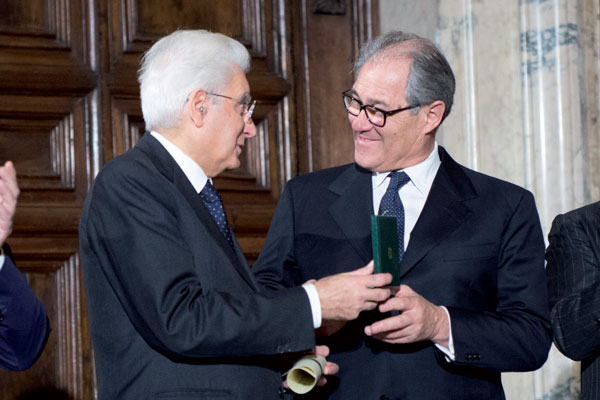 |
| 14 November 2016. Massimo Moschini receives the honorary title of Cavaliere del Lavoro from the President of the Italian Republic Sergio Mattarella. |
…I flee the traffic of Naples and I find myself a bit disorientated on the great road that points straight in the direction of the marvellous and, alas, underrated Royal Palace, the Reggia di Caserta: I am at San Marco Evangelista looking for the headquarters of Laminazione Sottile, specialised in the production of semiprocessed products in aluminium and, by way of its subsidiaries, in the reprocessing and finishing of this material for applications in the field of packaging.
The indications received simply tell of a the street number of a gate… “in front of the petrol station”.
I am halfway there, but I don’t see any signpost or indication and my surprise grows when before me appears a works that covers over 150 thousand square metres, half of which covered, in which several hundred people work.
I thus became acquainted with Neapolitan understatement…
A few recollections take me back many years, when I first met Massimo Moschini - who received his engineering degree in 1975 in the factory - who had me discover a reality difficult to imagine, when the principle of total quality was already put into practice with punctiliousness and rigour.
A company that I found changed in terms of production capacity - in the meantime tripled - in terms of manpower, organization and strategy, but still faithful to itself in re-asserting its founding values, not least the sincere cordiality and… the absence of signs at the entry.
Founded in 1923, Laminazione Sottile has changed over the years, under his guidance and those of his brothers Luca and Pietro, from a small local concern into an international group: 6 facilities in Italy, the UK and Austria, a turnover of 350 million and more than 800 employees. A story of family and personal commitment and success that, among other things won him the honorary title of Cavaliere del Lavoro. How does one manage to do this in Italy, and what is more in southern Italy?
 |
Everywhere success depends on factors that are more often than not endogenous, associated with values, rules, to the actual practices of a particular company. There is not much sense in complaining about the conditioning of the surrounding environment, even if the problems of Italy’s south differ from the country’s north.
And indeed our company has a series of peculiarities.
The first is fundamental: we have as always chosen to distribute to shareholders a small percentage of the profits, leaving the rest inside the company, to make investments and to create a financial liquidity necessary to proceed calmly and independently.
“Rich company, poor family”, as a manner of speaking obviously: a principle that my father has always sponsored and we brothers have always striven to make our own.
This is an important success factor, given that one of the principle difficulties of the Italian companies is underfunding.
Second qualifying point: we do not consider the company for its capital value, but for its turnover and hence the work it produces, and this determines our business approach.
The objective has in fact never been to grow in order to sell, which is why our focus has always been on the activity itself. This is a very strong family commitment, a paternal imprimatur that we brothers wish to pass on to our children.
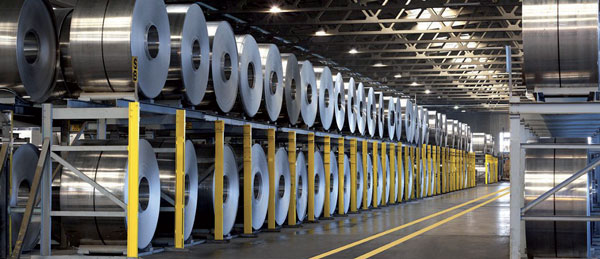
Seen from outside, the situation seems to present many unknowns…
We are going through an “interesting” period, featuring two generational changes that are occurring simultaneously. Our father passed away August 8 2015, and at the same time, my children started to work in the concern.
What we did, not without difficulty, was to distinguish the specific roles of competence of the family, of ownership and management.
Here a lack of clarity could be problematic.
The family is an institution that has to exclusively look after the wellbeing of people. Hence, if a nephew wants to become an artist, the family takes it upon itself to support him in his aspiration, reserving him the right of shareholder, as what is more laid down in the law of inheritance.
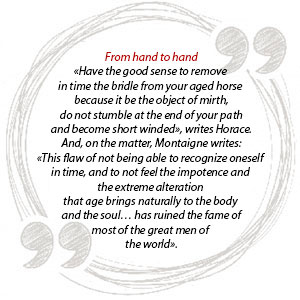 |
After that there is the ownership that, as I said before, has the mission of acting so that the company creates value in time and produces work, for the future generations, for family members, for employees, for the children of employees, etc…
And then there is management, achieved by merit…. a complex and delicate subject, because in inheritance it is difficult to establish “who is more capable”. It is not enough to have a qualification, maybe acquired at Harvard: we know many entrepreneurs who have not studied but have been successful.
And hence here too we sought a solution, considering the non negligible difference of age between me and my brothers and consequently between our children: different generations, each with their own vision, education, culture and sensibility. These are unwritten and unformalized rules, though, as far as I am concerned, I have imposed some limitations on my children, Andrea and Federica, that I hope will also be valid for my grandsons: get a good qualification and attain some years work experience in another concern.
This is the premise for entering into Laminazione Sottile and demonstrate ones own capabilities starting from the bottom, though, it would be stupid to say it wasn’t true, with all the facilitations that derive from the name. It is at any rate a great challenge. The generational changeover is complicated because, as I always say, if a cretin knew he were a cretin his behaviour would not be cretinous. And hence if one of your children, whether they have studied or not, considers him- or herself cut out for the job, you have to be able to manage them: no easy thing.
You are telling me there are two key elements, that are also interlinked: on the one hand company ethics, on the other governing the family? And if this is true, are there differences between concerns in the south and in the north of Italy?
Each and every aspect needs to be handled intelligently, the generational changeover imposes common sense and the capacity to manage and deal with people, and if that is lacking, training support and a good structuring of the company are to little or no avail.
As are as the conditioning of the local environment is concerned, the aspects change according to where one is. Our territory is complicated: one needs to keep a low profile, be mindful, but aboveall construct a company that is as ethical as possible.
Also because I believe that the ethics of a company in the broadest sense are an important business factor. These days a company that is not mindful in terms of the environment, safety, to the needs of the workers, that gives no growth prospects, does not grow or develop and does not offer training, is a company without a future (Laminazione Sottile has its own Ethical Code, Ed.): these features are not without their costs, to my mind, they are fundamentally important business levers.
In the south, as well as the discomfort of being marginal regarding the purchase of raw materials and the main markets, with infrastructure that is often poor, there are some positive factors. It may seem a paradox but the chronic lack of work leaves one with a virtually inexhaustible availability of human resources: we manage to find people who are ready and available, determined to leave a situation of serious social decay behind them. Things are a lot different in the north, as we experienced with the purchase of our Piedmontese facilities, now IPS Ariflex: It wasn’t easy to find personnel, because there, the problem is not work in general, but what kind of work. A practical example? We work on three shifts, including Saturday and Sunday, compensating the commitment with significantly higher wages, and we have never had any great difficulties in keeping up our rhythm of production. In northern Italy things were a bit more complicated.
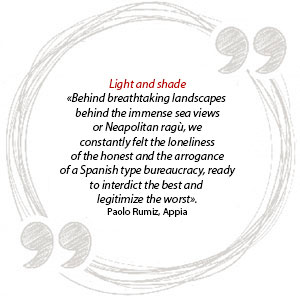 |
This is an interesting aspect…
The true problem here is the bureaucracy of bodies and institutions that do not understand that the world is in a hurry, that things need to be done in a certain way, that one has to be flexible about problems. That a heavy industry concern like our own does not have the same needs and cannot be managed like a pharmaceutical or food concern.
There is though a fairly banal rule: the more the system that surrounds it is disorganized and inefficient, the more authentic the excellences. Because being good at mechanical engineering in Turin is almost taken for granted, down here things are a little more complex.
Are relations with university a resource, even with a company like your own?
Are relations with university a resource, even with a company like your own?
Certainly. The provost of the University of Naples Gaetano Manfredi is doing a lot: among other things we took part in a work group on the engagement, on the training needs, on the professional skills that companies require, and hence on the level of communication between university and company, to start up study courses targeted to the need of industry.
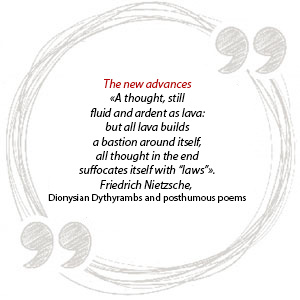 |
Something that is intelligent, but presents some limits. If the university trains the person along with the company, what happens to creativity?
For example, students of theoretical physics develop a mind that enables them to comprehend highly abstract things and then modelize the same. Those “brains” could be highly useful, even more so than an electronics engineer who knows how to set an inverter perfectly but who is lacking in inventiveness. Indeed, perhaps the real problem is bringing the free mind into the riverbed of company business, going from abstract to practical research.
Funding start-ups is all the rage, even with industrial groups. The theory is that innovation done inhouse is incremental in kind, with the risk sooner or later of finding oneself with someone who has invented something truly new, that upturns the profile of the market on which one is operating.
The world is evolving very rapidly. One only has to think of a future where 3D printers are capable or producing almost anything, with repercussions that one would be hard put to grasp on logistics, transportation, warehouses and spare parts.
It should be said that our product, aluminium laminate, is old and hasn’t changed. Despite that, for the coming 30 years, it will still be applied broadly.
Our production capacity of 150,000 tons/year is only a modest share of 3-4% of the global market, or that is the possible outlets for our laminate, that is worth 4 or 5 million tons: hence, for Laminazione Sottile, the problem is not so much volume but competitivity, or that is to make products that are evermore performant and precise.
In the drawing and press-moulding stage, the tolerances of the incoming semiprocessed sheets are decisive, that are now measured in microns. Our first objective is hence attaining a product with high quality standards and constant in time.
The San Marco Evangelista plant is of a similar size to our competitors (more than 90 thousand sqm covered): the difference lies in the fact that we only have one works and they have many, with the possibility of diversifying the different production units. The second challenge facing us is that of being equally efficient, perhaps even more so, with a greater variability and flexibility. Obviously at competitive production costs.
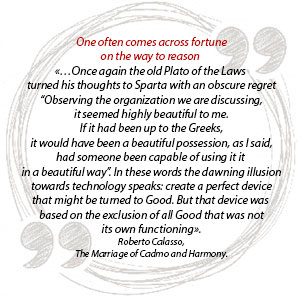 |
The third objective we have given ourselves is to reduce the lead time, bringing it from 4/6 weeks to 2. We are making a great effort, following two logics: on the one hand producing polyvalent semiprocessed items, unifying inhouse processing with a made-to-stock logic, on the other working to forecast, thanks to a highly sophisticated IT system.
From just in time to just in case: I have the suspicion that the demand for ever closer response times depends on the customer’s given incapacity to manage production programming...
The problem is that Amazon now delivers in 24 hours: It is a question of approach, and we have to adapt to it. One has to consider that nobody wants to warehouse stock, us included. On top of that, rapid order processing times become a competitive factor compared to products that come from emerging market, at uncontrolled and unbeatable prices. We can respond to all the needs that are impossible to program, with our capacity to make made-to-measure semiprocessed aluminium products, even in small lots.
Do you forecast a greater growth in Laminazione Sottile, or in the other companies in the group - Contital, Italcoat, Ariflex... - that convert semiprocessed goods in second, third and fourth processing stages?
Laminazione Sottile has over the last three years invested 80 million euros to increase its production capacity in the coming two years to 150 thousand tons and we hope to complete the update of a series of machines: I am sure we shall reap the fruits of this choice in the coming future.
Italcoat, that produces lacquered aluminium laminates in different alloys and measures, is already the sector leader, with an important share of the market at European level and hence aims a product innovation.

The same goes for Contital, specialised in the production of aluminium trays and PET, and IPS Ariflex, dedicated to the production of flexible packaging.
Hence, the objective of the Group is that of increasing the value of the overall offer, with finished products dedicated to the consumer market.
Thank you. Hence we now know what you want to do when you have grown up. You want to proceed as before… Until the next time around.













